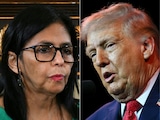- India-US relations face discord due to President Trump's tariffs on Indian imports
- Former US officials urge restoring ties to counter China's innovation and influence
- Tariffs and tensions risk pushing India towards China and Russia's strategic orbit, they said
Even as India-US relations witness a "moment of unprecedented discord" amid President Donald Trump's tariffs on Indian imports, former top American officials from the Joe Biden era believe that ties can and must be restored, so that the US "do not cede the innovation edge" to China. Former National Security Advisor (NSA) Jake Sullivan and ex-US Deputy Secretary Kurt M Campbell, in a joint article for Foreign Affairs, argued that the partnership between New Delhi and Washington enjoys "bipartisan support" and has "effectively disincentivised reckless Chinese adventurism" in the Indo-Pacific region.
The former US officials noted that there is a need for US partners "to impress on their Indian interlocutors that US President Donald Trump's theatrics are often the prelude to dealmaking."
The editorial comes on the backdrop of a deadlock in the India-US trade talks following the Trump administration's move to slap a cumulative 50 per cent tariff on India.
Sullivan and Campbell noted that "tariffs, Russian oil purchases, and renewed tensions regarding Pakistan have caused a rapid and regrettable downturn in the US-Indian relationship, replete with public insults and recriminations", and it was "prudent to remember why India has emerged over the last generation as one of the United States' most important global partners." They argued that if the current trajectory persists, Washington could lose a key strategic partner.
"As [Prime Minister Narendra] Modi's chummy appearance over the weekend with Chinese President Xi Jinping and Russian President Vladimir Putin made clear, the United States could end up driving India directly into its adversaries' arms," they wrote, referring to the three global leaders' meeting at the recently held Shanghai Cooperation Organisation (SCO) Summit.
India, meanwhile, could end up squeezed on all sides with an "unaccommodating power in China on its border and strained technology, education, and defence ties with the United States," they claimed.
"Given this reality, Washington and New Delhi must strive to do more than simply restore the old, suboptimal status quo," former officials added.
They noted that until this most recent dustup, multiple US presidents have pushed forward specific initiatives to advance the relationship with New Delhi and "convert a general sense of promise into something deeper and sustained, including President George W. Bush and Indian Prime Minister Manmohan Singh's landmark U.S.-India Civil Nuclear Agreement and President Joe Biden and Prime Minister Narendra Modi's cooperation in critical fields such as AI, biotechnology, and aerospace."
On 'India-Pakistan' Policy
Sullivan and Campbell also argued that Washington must refrain from "hyphenating its relations with India and Pakistan" and there should be no “India-Pakistan” policy in the US. They noted that American diplomacy in recent years has been heavily weighted toward New Delhi for a reason. "The United States has enduring interests in Pakistan in combating terrorism and limiting nuclear and missile proliferation, but these pale in significance to Washington's multifaceted and consequential interests regarding India's future," they said.
Their comments came against the backdrop of Trump taking credit for the ceasefire between India and Pakistan following the recent military conflict, despite India's repeated denial. After years of diplomatic shunning, US-Pakistan ties saw warmth recently when Donald Trump welcomed Pakistan's army chief, Field Marshal Asim Munir, at the White House and discussed trade, economic development, and cryptocurrency.
Days later, in July, the Trump administration announced a trade deal with Pakistan and said Washington would help Islamabad develop its "massive oil reserves". At the same time, the US slapped 25 per cent tariffs on Indian goods.
5 Pillars of Strength
Sullivan and Campbell claimed that a new strategic alliance between the United States and India would be established by a treaty subject to advice and consent by the U.S. Senate. "It would be built on five core pillars, with the aim of enhancing the mutual security, prosperity, and values of both countries."
They said that both nations would first need to agree on a ten-year action plan on the sharing of "artificial intelligence, semiconductors, biotech, quantum, clean energy, telecommunications, and aerospace" technologies, which will define the future.
"The goal would be to build a common technology ecosystem, linked to other allies, to ensure the United States and fellow democracies do not cede the innovation edge to competitors such as China. This would mean working together on both the “promote” agenda of bold public investments, common R&D, and shared talent—as well as the “protect” agenda of aligning export controls and cybersecurity measures," they said.















